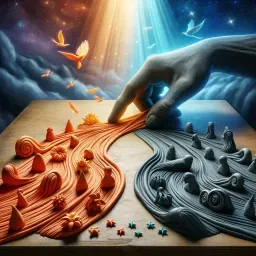Hell is empty and all the devils are here

- Meaning
- The phrase "Hell is empty and all the devils are here" can be viewed metaphorically to emphasize a situation in which chaos, conflict, or evil seems pervasive. In "The Tempest," Ariel uses this to underline the dramatic arrival of the play's protagonists who are portrayed metaphorically as 'devils' after surviving a shipwreck caused by magical intervention. It reflects the unveiling of human vices, often only attributed to malevolent supernatural entities, thereby commenting on the inherent nature of humans towards corruption or moral decay.
- Allegory
- The allegorical image features a desolate landscape under a tumultuous sky, representing the emptiness of a proverbial hell. The presence of human figures enacting different forms of conflict symbolizes the idea that the true turmoil or 'devils' reside among us, within our actions and interactions. Objects associated with hell, left unused, reinforce the notion that the evil traditionally attributed to external forces is actually a human manifestation, reflecting on the Shakespearean insight that often, the most significant conflicts and evils are the ones we bring upon ourselves and others.
- Applicability
- This saying can act as a philosophical reminder to be vigilant about the moral qualities of ourselves and those around us. It suggests that often, the worst chaos and malice in our world come from human actions, not from external demonic sources. This can encourage personal reflection and responsibility, promoting a consideration of the consequences our actions have on others and pushing for a more empathetic and ethical approach in our daily interactions.
- Impact
- As part of one of Shakespeare's most celebrated works, this phrase has made a significant cultural impact, resonating through centuries as a succinct expression of the manifestation of evil or turmoil within human society itself. It's often quoted in discussions or literary explorations concerning human nature, morality, and the metaphysical conceptions of good and evil.
- Historical Context
- The quote originates from "The Tempest," believed to have been written in 1610-1611, which is during the late period of Shakespeare's career. This period was significant for producing some of his most sophisticated plays which frequently explored themes of reconciliation and forgiveness.
- Criticisms
- While the phrase is generally met with fascination and reflection, its dark tone and the suggestion that humans are comparable to devils may be viewed as cynical or overly pessimistic about human nature. Some might argue it overlooks the potential for goodness and redemption in people.
- Variations
- This phrase is represented similarly across different cultures, typically emphasizing the idea that the source of evil or disruption lies not in mythical or external entities but within human beings themselves.
-

Alea iacta est
-

The fault, dear Brutus, is not in our stars, but in ourselves.
-

There is nothing either good or bad, but thinking makes it so.
-

Love looks not with the eyes but with the mind.
-

This above all: to thine own self be true, and it must follow, as the night the day, thou canst not then be false to any man.
-

The fool doth think he is wise, but the wise man knows himself to be a fool.
-

Errare humanum est.
-

Doubt thou the stars are fire; Doubt that the sun doth move; Doubt truth to be a liar; But never doubt I love.
-

It is not in the stars to hold our destiny but in ourselves
-

Be not afraid of greatness. Some are born great, some achieve greatness, and others have greatness thrust upon them.
-

To be, or not to be, that is the question.
-

Love all, trust a few, Do wrong to none: be able for thine enemy Rather in power than use; and keep thy friend Under thy own life's key: be check'd for silence, But never tax'd for speech.
No Comments